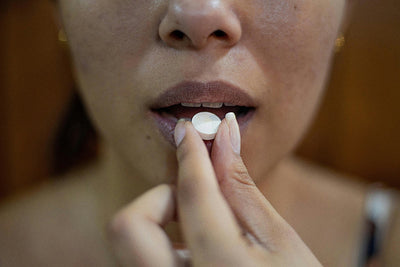How to Improve the Quality of Your Breast Milk
How to Improve the Quality of Your Breast Milk
by Jessica bipen, RD
You’ve probably heard that breast milk is “liquid gold.” While breast milk is the most natural nourishment for your baby, the quality of your breast milk matters. Most women assume that their breast milk meets all their baby’s nutritional needs, but your body can’t magically produce these essential nutrients if you’re not getting enough in your diet.
While lactating, many women are using up nutrient stores which get passed on to the baby, leaving mom depleted. The U.S. survey on nutritional status known as NHANES found that 47% of pregnant or breastfeeding women are deficient in at least one micronutrient.
The good news? You can improve the quality of your breast milk with your daily nutrition! This article will cover simple diet changes and how to know you’re getting the nutrients most commonly low in breastmilk.
The Basics
Breastfeeding is demanding - it takes a lot of energy to nourish your baby around the clock. A lactating woman needs around 500 more calories while exclusively breastfeeding. On top of that, you need more protein, carbohydrates, fats, vitamins and minerals than usual to make sure both you and your baby are getting the right amount.
To ensure you’re getting enough calories, focus on nutritionally dense foods that have lots of vitamins and minerals. Focus on meals that contain high quality protein, healthy fats and fiber-rich complex carbs like whole grains, fruits and vegetables. Reducing the amount of processed foods, sugar and refined carbs will also help.
Here are certain nutrients you’ll also want to keep an eye on.
Nutrients Breastmilk Commonly Lacks
Calcium
This mineral is important for skeletal structure; cell, muscle and nerve function; and for blood clotting. Studies have shown that women often lose 3 to 5 percent of their bone mass while breastfeeding (which they quickly get back after weaning). This may be caused by the growing baby’s high need for calcium, which is drawn from the mother’s bones.
Good sources of calcium include
- Dairy products
- Dark green, leafy vegetables like broccoli, collard greens, and bok choy
- Canned sardines
- Salmon with bones
- Tofu
- Almonds
- Corn tortillas
Vitamin C
This antioxidant is an important building block for collagen and connective tissue, and it plays a part in absorbing iron. How much Vitamin C is in breast milk depends on the mother’s diet.
Vitamin C is found in most fruits and vegetables but the best sources include guavas, bell peppers, kiwifruit, strawberries, oranges, papayas, broccoli, tomatoes, and Brussels sprouts.
DHA
One of the most important parts of a baby's brain development is DHA. This omega-3 fatty acid is super important for growing neural and vision cells. By boosting DHA in your diet you can increase the amount in your breastmilk. The best sources of DHA include salmon, mackerel, anchovies, sardines, cod, and herring.
Iron
Iron is needed for neurological development, creating hemoglobin (a protein in red blood cells that delivers oxygen to organs), and preventing anemia. Low levels have been associated with anemia in mothers, which is common during pregnancy due to increased needs and blood loss while giving birth.
Think of foods like
- Beef, lamb, pork, fish, and eggs
- Grains
- Chickpeas
- Spinach, broccoli and brussels sprouts.
- To help with absorbing iron in plant-based foods, pair the iron-rich foods with vitamin C. Bell peppers, kiwi, oranges, and strawberries are great options.
Vitamin A
Vitamin A plays an important role in vision, immunity, development of the nervous system and bones. Up to 60% of mothers have low retinol levels in milk and low vitamin A levels in milk are even more common for mothers of preterm infants.
To increase your vitamin A levels, add
- Fatty fish like salmon
- Yogurt
- Liver
- Yellow, red and leafy green vegetables like spinach, carrots, sweet potatoes and red peppers
- Yellow fruit like mango, papaya and apricots.
Vitamin B12
Vitamin B12 is in the top 3 most common micronutrient deficiencies affecting pregnant and nursing moms. It’s needed for healthy neurological development and red blood cells. If the mother is low in B12, her child may also become deficient. This is even more common for vegan and vegetarian mothers who don’t supplement.
The best sources of vitamin B12 include meat, fish, eggs, and milk. Unless fortified, most plant foods do not contain B12 in adequate amounts.
Test, Don’t Guess
Breastfeeding moms who want to learn how their diet affects their breastmilk can use a Lactation Lab to analyze their breastmilk for essential nutrients.
It’s like a nutrition label for your breast milk and gives you peace of mind and the power to optimize the health of your baby.
Note: The views expressed in this article belong to the author.
About the Author
Jessica Bipen is a Registered Dietitian. Find out more about Jessica on her website and follow her on Instagram for delicious recipes and all things nutrition!
References
Bird JK, Murphy RA, Ciappio ED, McBurney MI. Risk of Deficiency in Multiple Concurrent Micronutrients in Children and Adults in the United States. Nutrients. 2017;9(7):655. Published 2017 Jun 24. doi:10.3390/nu9070655. https://www.ncbi.nlm.nih.gov/pmc/articles/PMC5537775/
Caloric needs and vitamin and mineral deficiencies:
Kominiarek MA, Rajan P. Nutrition Recommendations in Pregnancy and Lactation. Med Clin North Am. 2016;100(6):1199-1215. doi:10.1016/j.mcna.2016.06.004. https://www.ncbi.nlm.nih.gov/pmc/articles/PMC5104202/
Calcium bone loss:
Pregnancy, Breastfeeding and Bone Health. NIH Osteoporosis and Related Bone Diseases National Resource Center. NIH Pub. No. 18-788. https://www.bones.nih.gov/health-info/bone/bone-health/pregnancy
DHA:
Lauritzen L, Brambilla P, Mazzocchi A, Harsløf LB, Ciappolino V, Agostoni C. DHA Effects in Brain Development and Function. Nutrients. 2016;8(1):6. Published 2016 Jan 4. doi:10.3390/nu8010006. https://www.ncbi.nlm.nih.gov/pmc/articles/PMC4728620/
Vitamin A:
Matamoros N, Visentin S, Ferrari G, Falivene M, Fasano V, González HF. Vitamin A content in mature breast milk and its adequacy to the nutritional recommendations for infants. Arch Argent Pediatr. 2018 Apr 1;116(2):146-148. English, Spanish. doi: 10.5546/aap.2018.eng.146. PMID: 29557610. https://pubmed.ncbi.nlm.nih.gov/29557610/






